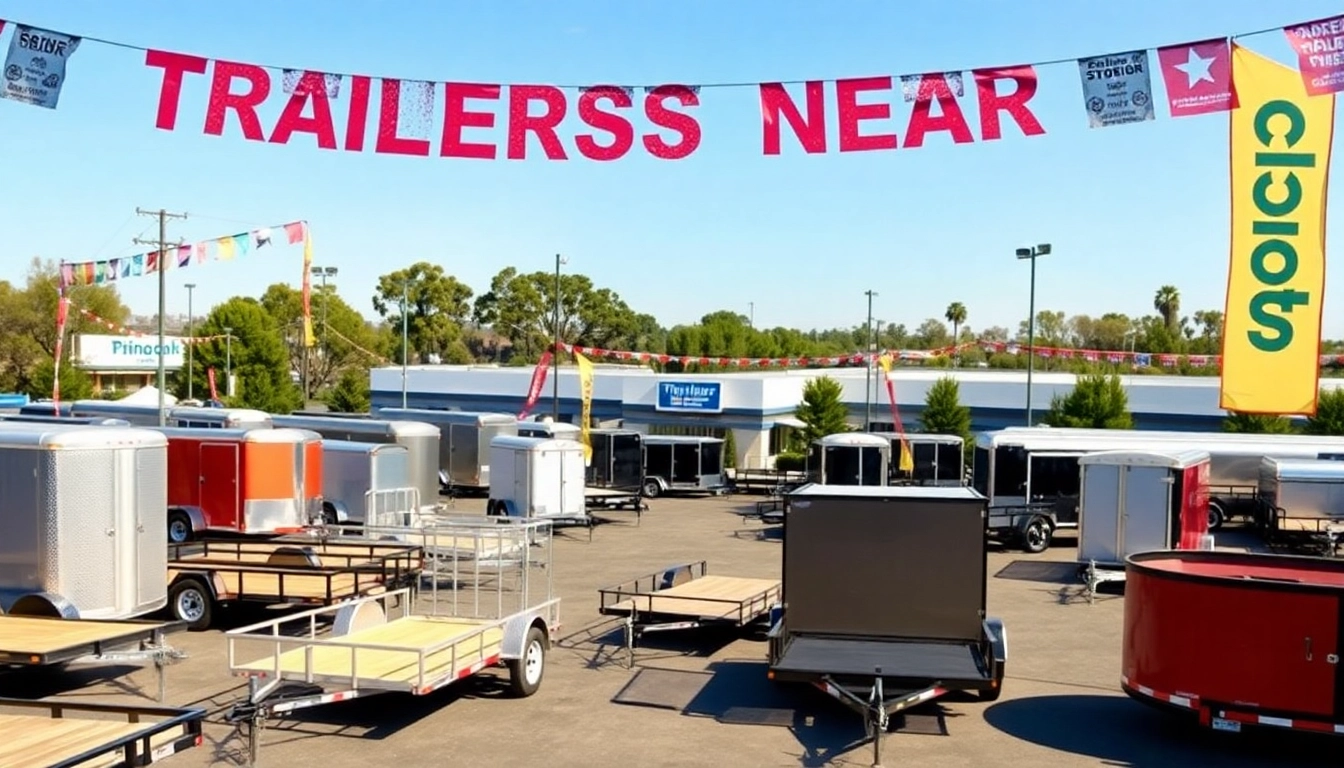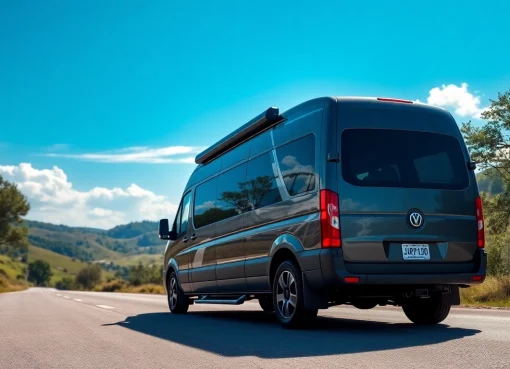Finding Quality Trailers Near Me: Your Complete Guide

Understanding Trailers and Their Types
In the realm of transportation and logistics, trailers play a pivotal role. They are essential tools for businesses and personal endeavors alike, allowing for the efficient movement of goods, equipment, and materials. When looking for trailers near me, understanding the various types available can greatly enhance your decision-making capabilities. The following section will explore the common variations of trailers, their benefits, and how to assess your specific trailing needs.
Common Trailer Variations
Trailers come in numerous shapes, sizes, and configurations, specifically tailored to meet different hauling requirements. Below are some of the most common trailer types:
- Utility Trailers: These versatile trailers are ideal for transporting a variety of items, from landscaping equipment to furniture. Their open design allows for easy loading and unloading.
- Enclosed Trailers: Offering protection from weather and road debris, enclosed trailers are perfect for hauling valuable items such as motorcycles, cars, or sensitive equipment.
- Dump Trailers: Designed for heavy-duty tasks, dump trailers are essential for construction and landscaping jobs, allowing for easy unloading through hydraulic systems.
- Flatbed Trailers: With no sides or roof, flatbed trailers provide flexibility for loading oversized or easily accessible cargo.
- Car Haulers: Specifically designed for transporting vehicles, these trailers come in two main types: open and enclosed, catering to various protection and loading needs.
Benefits of Choosing the Right Trailer
Selecting the appropriate trailer for your needs can save time, reduce costs, and enhance safety. Here are key benefits:
- Efficiency: The right trailer allows for optimized transport, minimizing the number of trips required.
- Cost-Effectiveness: A suitable trailer can significantly reduce costs associated with rentals and damages.
- Safety: Using the correct trailer ensures that cargo is transported securely, minimizing the risk of accidents or losses.
- Versatility: Many trailers can be customized or adapted for specific needs, enabling a wider range of hauling options.
How to Assess Your Trailing Needs
Determining the right trailer requires careful evaluation of several factors:
- Load Capacity: Understand the weight of the items you plan to haul to ensure your trailer can accommodate them.
- Dimensions: Consider the size of your cargo and choose a trailer that provides sufficient space while allowing for secure transport.
- Frequency of Use: Analyze how often you will need the trailer. If it’s for occasional use, renting might be a better option than purchasing.
- Terrain: Consider where you’ll be towing the trailer. Certain trailers are better suited for rough terrain than others.
Where to Find Trailers Near Me
With a clear understanding of your needs, the next step is to locate available options. Fortunately, there are multiple sources for finding trailers near you.
Local Dealerships and Their Offers
Local dealerships often provide a variety of new and used trailers. These establishments can offer numerous advantages:
- Expert Guidance: Sales representatives can offer unmatched expertise, helping you choose the best trailer based on your specific requirements.
- Competitive Pricing: Many dealerships provide competitive prices and flexible financing options to ease your purchasing process.
- After-Sales Support: Reputable dealers often offer maintenance and repair services, ensuring your trailer stays in peak condition.
Online Marketplaces and Classifieds
The rise of online marketplaces has transformed the way people buy trailers. Websites allow for:
- Convenience: You can browse a vast selection of trailers from the comfort of your home.
- Direct Negotiation: Many online sellers allow direct communication, leading to better negotiation on price and terms.
- Greater Variety: Access to a wider range of products beyond your local area can enhance your options considerably.
Factors to Consider When Choosing a Seller
Not all sellers are created equal. Here are some factors to consider when selecting a trailer seller:
- Reputation: Look for reviews or testimonials that highlight the seller’s reliability and quality of service.
- Condition of Trailers: Whether buying new or used, ensure that the trailer is in suitable and safe condition.
- Warranty and Return Policy: A strong warranty or favorable return policies can provide peace of mind when making a significant purchase.
Evaluating Trailer Specifications and Features
Once you’ve located potential trailers, it’s vital to evaluate their features and specifications to make an informed choice.
Weight Capacity and Size
Each trailer has a weight capacity rating that outlines the maximum weight it can safely transport. Ensure you:
- Check the Gross Vehicle Weight Rating (GVWR), which takes into account the trailer’s weight plus its cargo.
- Match the size of the trailer to the dimensions of the items you’ll be hauling, ensuring proper fit and security.
Durability and Construction Material
The materials used in a trailer’s construction significantly impact its longevity and performance:
- Steel Trailers: While heavier, they offer incredible durability and are ideal for heavy payloads.
- Aluminum Trailers: Lightweight and resistant to rust, they are easier to tow but may not be as strong for heavy loads.
- Composite Materials: Emerging options that combine durability with weight savings, offering increased performance.
Safety Features to Look For
Safety should always be a primary concern when evaluating trailers. Key features to consider include:
- Braking Systems: Ensure that the trailer has adequate braking capabilities, particularly for heavier loads.
- Lighting: Proper trailer lighting is essential for visibility and safety on the road.
- Tie Downs: Check for built-in tie-down points to secure loads safely during transport.
Financing Options for Trailer Purchases
Understanding your financing options can make a significant difference in acquiring your trailer. Various pathways exist to fund your trailer purchase effectively.
Understanding Trailer Pricing
The cost of trailers can vary widely based on type, brand, and condition. Factors that contribute to pricing include:
- Type of Trailer: Specialty or heavy-duty trailers tend to be more expensive due to their construction and capabilities.
- Market Demand: Local demand can influence trailer prices; check for price trends in your area.
- Condition: Used trailers are generally less expensive but carefully assess their condition before purchase.
Loan Options for Buyers
Various financing options are available for purchasing trailers, including:
- Personal Loans: These can be a straightforward way to finance your trailer purchase, especially for those with good credit.
- Dealer Financing: Many dealerships offer financing packages that can be tailored to your budget and credit standing.
- Credit Cards: For those looking to finance a smaller purchase, credit cards can be a quick solution.
Negotiating the Best Purchase Deal
Negotiation skills can save you considerable money when purchasing a trailer. Tips to enhance your negotiation include:
- Do Your Research: Before negotiating, familiarize yourself with average prices for similar trailers to establish a baseline.
- Be Prepared to Walk Away: If the terms don’t meet your expectations, showing that you are willing to walk away can strengthen your negotiating position.
- Ask for Additional Perks: Instead of focusing solely on price, inquire about extras such as maintenance offers or warranties.
Maintaining and Servicing Your Trailer
Proper maintenance is crucial to extending the life of your trailer and ensuring it operates safely. Implementing a regular maintenance routine can prevent costly repairs down the line.
Essential Trailer Maintenance Tips
Keeping your trailer in top condition involves several routine practices:
- Regular Inspections: Conduct periodic checks on tires, brakes, lights, and other critical systems.
- Cleansing: Regularly wash your trailer to remove debris, dirt, and contaminants that can lead to corrosion.
- Lubrication: Ensure moving parts are regularly lubricated to prevent wear and tear over time.
Common Repairs and When to Seek Help
Even with regular maintenance, repairs may be necessary. Common issues include:
- Tire Replacement: Check for wear and replace tires as needed to maintain safety and performance.
- Brake Repairs: Address any signs of brake failure immediately to avoid dangerous situations.
- Electrical Issues: If lights or lighting systems fail, consult a professional to address wiring problems.
Resources for Trailer Parts and Accessories
Finding quality parts and accessories is essential for maintaining your trailer:
- Authorized Dealers: Consider parts from authorized dealers for optimal fit and quality.
- Online Retailers: Many online platforms offer a wide range of trailer parts and accessories at competitive prices.
- Local Auto Parts Stores: These stores often stock common components that may be needed for maintenance and repair.



Leave a Comment